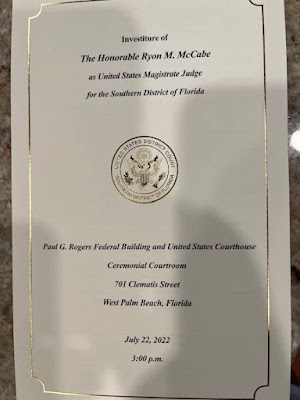by Michael Caruso
I recently had the pleasure of speaking with U.S. Attorney Tony Gonzalez to several law students participating in Judge Bloom’s Judicial Internship Academy this summer. Judge Bloom’s efforts are truly a force for good by opening this fantastic opportunity for many more law students. A judicial internship during law school provides students with a direct insight into the judicial process and is a valuable and enriching experience. The students gain practical experience by attending judicial proceedings, performing legal research, and providing other assistance to the judge. During the summer, the internship also exposes the students to practicing lawyers. And, of course, the internships may broaden the future employment opportunities of these students. I found the students to be smart, engaged, and committed. They also happened to be quite diverse.
A recent article published in the Notre Dame Law Review Reflection makes the case for diversity in law clerk hiring as “an imperative that basic democratic principles compel. The importance of diversity is not in demographics alone or the legitimacy that may flow from those numbers. Rather, the purpose is to ensure that the judiciary benefits from a range of perspectives that more accurately reflect those who are affected by the law.”
According to the article, in 2000, over 90% of all federal appellate judges were white. Today, 77% of federal appellate judges are white. “Although the past twenty-two years have brought modest changes to the racial composition of federal judges, the slight demographic shift has yet to trickle down to the law clerks that staff their chambers. Over time, the voices in those chambers remain increasingly white. In 2006, 74.5% of law clerks were white. In 2019—the most recent data available—that percentage grew to 79%.”
The authors propose several changes to the law clerk hiring system. First, judges should explicitly allow for more fluidity in the application materials they request so that racially diverse applicants can provide more relevant information. Second, the federal judiciary may want to explicitly focus on law clerk hiring and how current markers of achievement are likely to limit the racial diversity of a pool of clerkship applicants. Third, judges may wish to reconsider how they sort through clerkship applicants.
Law schools also can make changes to increase the racial diversity of the clerkship pool by making more of an effort to educate students about clerkships early on and to level the playing field for students who may be interested. Relatedly, professors should ensure that they equally offer underrepresented students opportunities.
Current and former law clerks can also help change the clerkship pipeline. Clerks who have gone through the clerkship application and interview process can offer unique insights to diverse applicants and ensure they have as much information as possible. Recently, local Miami lawyer and former law clerk, Chris Lomax organized a “Pathways to Federal Clerkships” event that did just that.
The authors conclude: “Judges, lawyers, and law schools must all commit to addressing the lack of diversity among law clerks while being accountable for the part they have to play in the current lack of diversity. Without owning their individual roles in creating this problem or committing to solve it, nothing will truly change—we will continue robotically requesting the same inputs and be dismayed at the same, stale outcomes. We owe it to the future of the profession to do better than what we are doing now.”
Judge Bloom and Chris Lomax are doing their part; we all need to step up.


